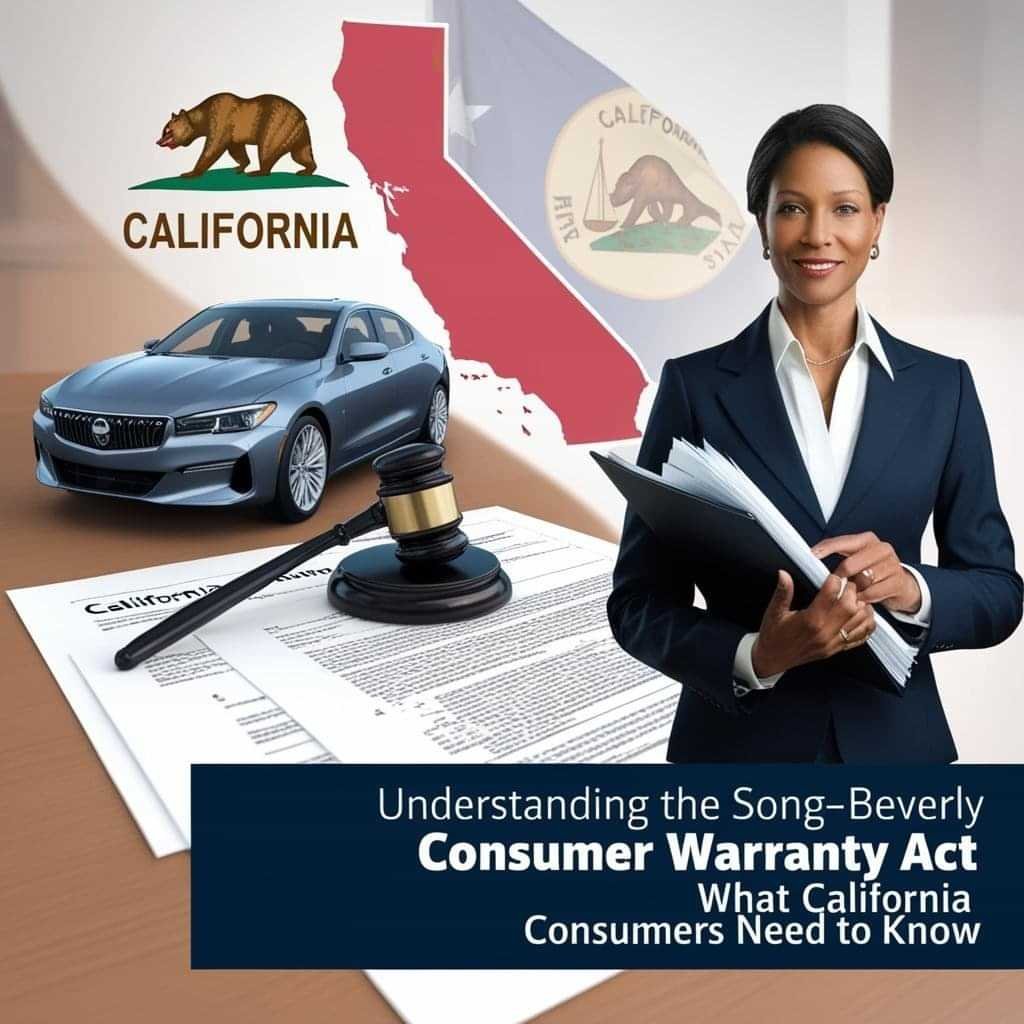The Song-Beverly Consumer Warranty Act is one of California’s most powerful consumer protection laws. Enacted to ensure that residents receive fair treatment when purchasing or leasing goods, this act specifically focuses on warranties and the responsibilities of manufacturers and retailers. If you’ve recently bought a defective product—particularly a vehicle—this law could be your strongest legal ally.
At its core, the Song-Beverly Consumer Warranty Act mandates that manufacturers who offer express warranties on their products must either repair, replace, or refund defective goods that cannot be fixed after a reasonable number of attempts. It covers a broad range of consumer goods, but it is especially relevant to automobiles, where the California Lemon Law comes into play as an extension of this statute.
What Does the Song-Beverly Consumer Warranty Act Cover?
The Song-Beverly Consumer Warranty Act applies to most consumer goods sold or leased in California, provided they come with an express warranty. That means everything from cars and motorcycles to appliances and electronics can fall under this law. However, its most commonly known application is within the automotive industry.
Vehicles purchased or leased for personal, family, or household use are covered, and if a defect significantly impairs the vehicle’s use, value, or safety—and it cannot be repaired after multiple attempts—the consumer may be entitled to a refund or replacement under the California Lemon Law.
Understanding your lemon law rights is critical here. Many consumers aren’t aware that they have legal remedies when faced with persistent defects. The Song-Beverly Consumer Warranty Act empowers them to demand accountability from manufacturers.
Key Provisions of the Song-Beverly Consumer Warranty Act
A standout feature of the Song-Beverly Consumer Warranty Act is its requirement that repairs must be completed within a reasonable time and number of attempts. If the manufacturer fails to meet this standard, they must either replace the item or offer a refund.
It also stipulates that these rights are non-waivable. That means a manufacturer cannot force a consumer to relinquish these protections—even through a warranty agreement. This is particularly useful when dealing with complex or high-value products, like automobiles, where a failure to honor warranties can lead to costly consequences.
Additionally, the act ensures that consumers can recover attorney fees if they prevail in a legal case. This provision reduces the financial risk of pursuing a California Lemon Law claim and makes legal help more accessible.
How the Song-Beverly Consumer Warranty Act Connects to the California Lemon Law
While the Song-Beverly Consumer Warranty Act covers a wide range of goods, its relationship with the California Lemon Law is where it gains the most traction. The lemon law is essentially a subset of the Act that deals exclusively with vehicles.
Under the California Lemon Law, if your vehicle is under warranty and suffers from recurring problems that the dealer or manufacturer cannot fix, you may qualify for a replacement vehicle or a full refund. This complements your lemon law rights, which were created to protect consumers from being stuck with unreliable, unsafe, or unusable vehicles.
For example, suppose you’ve taken your car in for the same repair four times and it’s still not resolved. In that case, you may be eligible to initiate a California Lemon Law claim under the broader umbrella of the Song-Beverly Consumer Warranty Act.
When to Pursue a Lemon Law Claim
If your vehicle or another warranted product is consistently defective, don’t wait too long to act. There are specific timeframes for bringing claims under the Song-Beverly Consumer Warranty Act, typically within the duration of the warranty period.
In many cases, consumers may overlook their lemon law rights simply because they’re unaware of them. Consulting with a lemon law attorney can clarify your eligibility and the strength of your case. Because the act provides for the recovery of legal fees, hiring an attorney may come at no cost to you if you win.
How to Document and Strengthen Your Case
To take full advantage of the Song-Beverly Consumer Warranty Act, keeping detailed records is vital. Each time you visit a dealership or repair center, document:
- The reason for your visit
- The repairs attempted
- The number of days the vehicle was out of service
- Any communications with the manufacturer
These records support your California Lemon Law claim and make it easier to prove that the manufacturer failed to meet their legal obligations.
In addition, if you’ve already started experiencing recurring defects, review your warranty to confirm coverage. A written warranty that was provided at the time of purchase is typically necessary to proceed with a claim under the Song-Beverly Consumer Warranty Act.
Why This Law Is Important for California Consumers
The Song-Beverly Consumer Warranty Act isn’t just a legal technicality—it’s a vital shield for consumers who are frequently at a disadvantage when dealing with large corporations and manufacturers. It ensures you’re not left stuck with defective products and empowers you with enforceable lemon law rights.
California is known for having some of the strongest consumer protections in the country. This act is a prime example of how the state safeguards its residents, especially when it comes to big-ticket purchases like cars and trucks. If you live in California and you’ve bought a product that just doesn’t work as promised, you may have far more recourse than you think—thanks to this powerful law.
Final Thoughts
The Song-Beverly Consumer Warranty Act is a critical resource for anyone in California who has purchased or leased a defective product. Whether you’re struggling with a faulty car or malfunctioning appliance, this act could be the solution you’re looking for. Remember to review your warranty, document your repair history, and take action sooner rather than later.
By understanding your California Lemon Law protections and leveraging your lemon law rights, you can ensure that your consumer rights are respected—and that you get the value you paid for.

